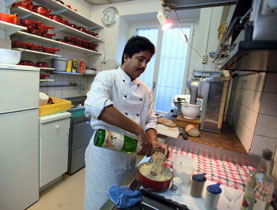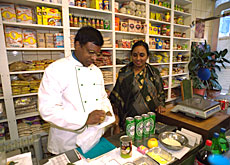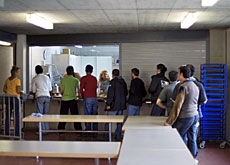Swiss Tamils meet integration challenges

When you are a refugee, a willingness to work hard and to blend into the host community is not always a guarantee of acceptance.
Tamils are said to be one of the best-integrated groups of foreigners in Switzerland, but a study shows that they often work in low-paid jobs and find it hard to break out of poverty. Their children tend to have more success.
The study, carried out by the Swiss Forum for Migration and Population Studies for the Federal Migration Office, puts part of the blame on the Swiss authorities, which for many years failed to give the Tamils a secure residence status.
Tamils started arriving in Switzerland in the 1980s, fleeing an upsurge in violence in Sri Lanka. But the authorities did not want to make Switzerland too attractive, and very few were recognised as refugees. The others were left in legal limbo. It was not until 2000 that a change of policy gave the majority of Tamils residence status.
The report says this treatment still affects the older generation. But it says that the future looks much brighter for their Swiss-born children.
The precarious residency situation of the first refugees meant that they were ineligible for training courses, which pushed them into unskilled jobs. The uncertainty as to whether they would be allowed to stay was a disincentive to learn the language.
Uruthiramoorthy, vice president of Freiplatzaktion in Basel, an organisation which advises Tamils and others, put the integration of the first generation of Tamils into context.
“We were accepted – but in what sense? That’s the problem. We were simply seen as hardworking people – at that time, 15 to 20 years ago. They just welcomed us as workers in lower level jobs,” he told swissinfo.
The reputation for reliability spread, said Moorthy – who shortens his name for Swiss consumption, as Tamils do not have family names.
“But they didn’t say Tamils ‘work well’. They said they ‘integrate well.’ That wasn’t correct.”
At the same time, he noted that the less than warm welcome was not surprising.
“When you are a foreigner, you are a foreigner… You are not welcome. That’s normal. It’ll always be there. Not only in Switzerland, but everywhere.”
He recalled how the popular newspaper Blick used to “pick on” the Tamils in the 1980s. “Now it’s a different picture, of course. We are no longer in the media. Perhaps because we have been forgotten.”
The second generation
More than 20 years after Tamils first started arriving, a whole new generation has grown up in Switzerland.
“The second generation really has no problems. They don’t think in the same way that we of the first generation think. They are just like Swiss of the same age,” said Moorthy.
The Migration Office study comments on the skill with which young Tamils move between two cultures. They are completely at home with the Swiss way of life, but they tend to marry within their own community. “Their family life is usually determined by values and conventions of Tamil culture,” it says.
Nevertheless, Moorthy believes that although Tamil children grow up speaking Tamil at home, and almost all of them attend special Tamil schools outside normal school hours where they learn to read and write the language, Sri Lanka is a foreign country for them.
As for the older generation, their attitude to their homeland is different. “We used to dream of going back. Not any more,” he said, pointing out that the war still continues with no end in sight. He is grateful to be Swiss, and that he will never have to flee anywhere again.
But even with a Swiss passport and a life built in Switzerland, “being Tamil is in our blood. That isn’t something that will go away”.
swissinfo, Julia Slater
Sri Lankans are one of the biggest migrant groups in Switzerland.
There are 42,000 people of Sri Lankan origin in the country.
Between 90 and 95 per cent of them are Tamils.
Since 1973 more than 11,000 Sri Lankans have acquired Swiss citizenship.
One third of the Sri Lankans with permanent residence or Swiss citizenship were born in Switzerland.
The Tamils in Switzerland live mainly in the German-speaking areas, in particular cantons Bern, Zurich and Basel.
The influx of Tamil refugees to Switzerland started in 1984 after the flare-up of the conflict in Sri Lanka aimed at the creation of a separate Tamil state in the north and eastern part of the island.
With the end of the ceasefire in Sri Lanka at the beginning of January Switzerland is expecting a new influx of refugees.
In 2007 the number of asylum requests from Sri Lanka had gone up to 618, in comparison with 328 in the previous year.

In compliance with the JTI standards
More: SWI swissinfo.ch certified by the Journalism Trust Initiative



You can find an overview of ongoing debates with our journalists here. Please join us!
If you want to start a conversation about a topic raised in this article or want to report factual errors, email us at english@swissinfo.ch.